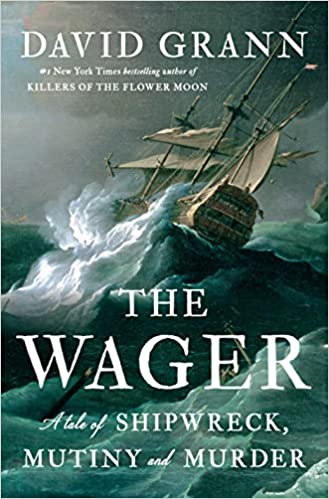The Wager — Book Review
The Wager: A Tale of Shipwreck, Mutiny, and Murder, by David Grann
Book Review by Anne Newins

Anne Newins
It has been a while since I have wanted to submit a rave review, but The Wager meets that standard. Numerous other publications, such as the New York Times (“disturbing and riveting”) and Washington Post (“a maestro in his ability”) are praising the book, but I wanted to put in a plug in The Complement because the RVM library recently acquired a copy. Sadly, some of our best non-fiction has relatively little circulation. In comparison, the Jackson County library system has over 150 people requesting the book in each its various modalities, so odds are a Manor resident could obtain our copy more quickly.
A few resident history buffs may remember the War of Jenkins’s Ear, a conflict between Spain and Britain that lasted from 1739 to 1748, and which was largely unsuccessful on Britain’s part. As part of this dispute, the warship Wager, along with a number of other ships, was dispatched in 1740 from England to South America. Supposedly the fleet was to defend the British Empire, but it was an attempt to plunder Spanish galleons for treasure. It was an abysmal failure, with thousands of lives lost.
Ear, a conflict between Spain and Britain that lasted from 1739 to 1748, and which was largely unsuccessful on Britain’s part. As part of this dispute, the warship Wager, along with a number of other ships, was dispatched in 1740 from England to South America. Supposedly the fleet was to defend the British Empire, but it was an attempt to plunder Spanish galleons for treasure. It was an abysmal failure, with thousands of lives lost.
Never in top condition, The Wager lost sight of the other ships after trying to circumnavigate Cape Horn and then wrecked on a barren island off Patagonia. By this time, the crew had experienced many deaths from a typhus outbreak as well as scurvy. The toothless, battered, and diseased crew established themselves in ramshackle settlements on the island, now named after the Wager. Starving and despairing, the castaways broke into wrangling, and eventually violent, subgroups.
Although many characters are detailed, the three described in most depth are Captain Cheap, Gunner Bulkeley, and Midshipman Byron, an ancestor of the famous poet. Cheap’s rigidity alienates the crew and consequently Bulkeley gathers adherents. After months of appalling conditions, a ship of sorts is built in an effort to reach Brazil. Bulkeley and others declare mutiny and then, astonishingly, succeed making an eastward circuit. Thirty survivors wash up on coastal Brazil. Cheap, who refused to leave, remained on the island with a handful of others, still determined to sail northward. These efforts were unsuccessful, but they eventually were rescued by native people and taken to a Spanish-occupied town in Chile.
By 1746, the few remaining survivors made it back to England and the final drama of the book begins: how should Bulkeley and his followers be tried for mutiny? By then an assortment of books, including Bulkeley’s ship’s log, had been published, along with much misinformation. No spoiler alerts from me!
Grann’s writing is detailed, but engrossing. He has meticulously researched not only the history of this expedition, but vividly describes shipbuilding during the 18th century, life on board, the political context, and the obstacles to sailing in the southern seas. The Guardian describes the book well: “…the beauty of The Wager unfurls like a great sail. Grann’s book is not about romance but truth and he has prepared the reader…His literary references suddenly come into focus and lift the book to become something greater than an adventure tale.”

